If you’re considering new kitchen cabinets, you may be wondering about the difference between satin and semi gloss finishes. Both of these cabinet coatings have their own unique benefits, but which one is right for your home? In this guide, we will answer some of the most common questions about satin vs. semi gloss kitchen cabinets. We’ll help you decide which finish is best for your needs, and provide tips on how to care for them both!
What is a Satin Cabinet Finish?
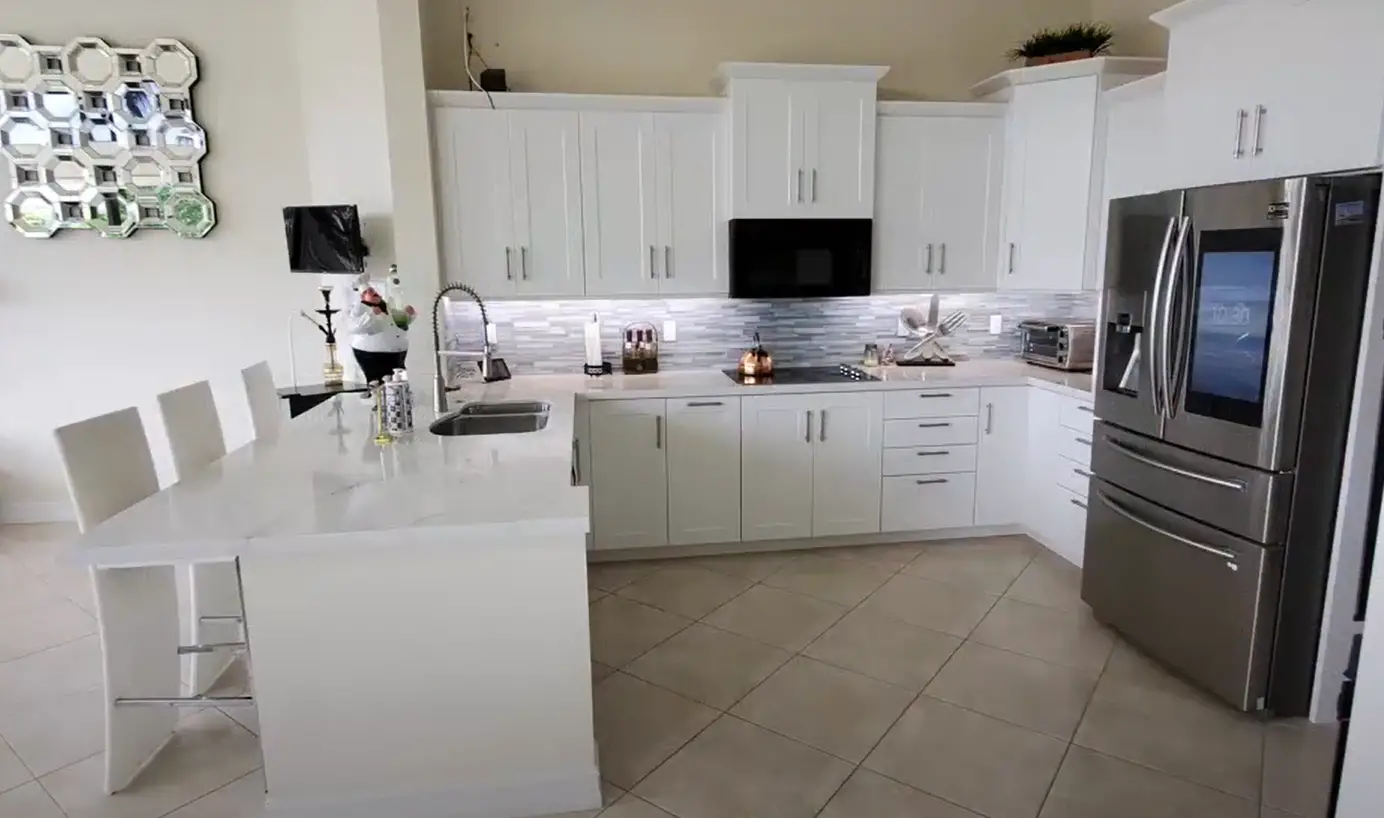
A satin cabinet finish is a smooth, low-sheen finish that is very popular in today’s kitchens. It has a softer look than a semi-gloss or high-gloss finish and is very easy to clean. Satin finishes are often used on kitchen cabinets, as well as on bathroom vanities and other woodwork in the home.
Satin cabinet finishes are typically achieved with a paint or stain that has been mixed with a glossy agent. This creates a smooth, even surface that reflects light beautifully. However, because of the glossy agent, satin paints and stains can be more difficult to work with than their non-glossy counterparts. If you’re not careful, they can leave behind streaks or brush marks. [1], [2]
What is a Semi Gloss Cabinet Finish?
A semi gloss cabinet finish is just what it sounds like: a finish that is somewhere in between a full gloss and satin. A semi gloss has a higher sheen than a satin, but isn’t as shiny as a full gloss. It has a sleek, shiny appearance that is very popular in today’s kitchens. emi-gloss finishes are often used on kitchen cabinets, as well as on bathroom vanities and other woodwork in the home. Semi-gloss finishes are easy to clean and maintain, but they can show fingerprints and smudges more easily than satin or matte finishes. [1], [2]
Differences Between Satin and Semi Gloss Finishes
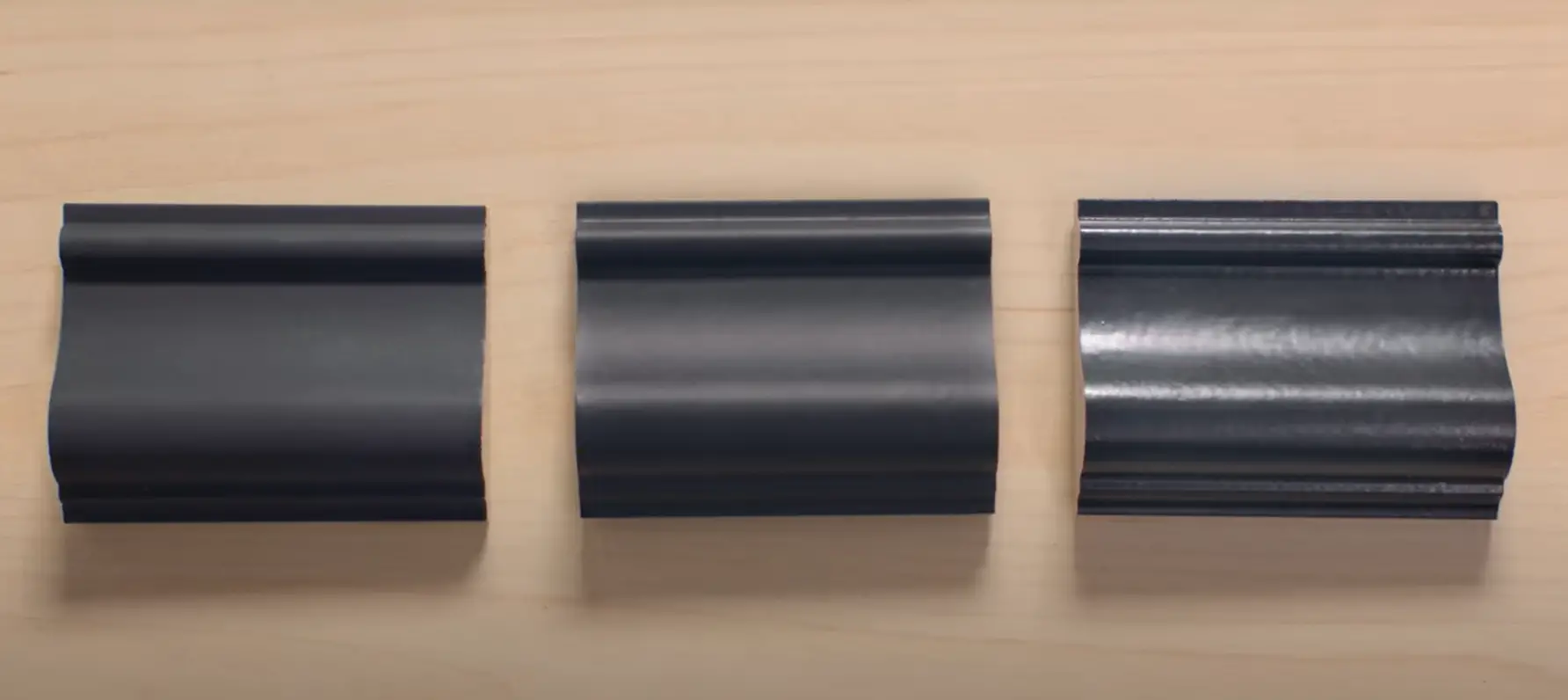
Now that we know a little more about the two finishes, let’s discuss the key differences between them.
Application
The first difference between satin and semi gloss finishes is in their application. Semi-gloss is much easier to apply than satin. This is because semi-gloss has a higher resin content, which makes it more viscous. Viscosity is a measure of a fluid’s resistance to flow. The higher the viscosity, the thicker the fluid. This means that semi-gloss will not run or drip as easily as satin, making it ideal for painting surfaces that require a smooth finish.
Satin, on the other hand, has a lower resin content and is therefore less viscous. This makes it more difficult to apply evenly, especially on larger surfaces. It is also more likely to drip and run than semi-gloss. [1], [2]
Sheen
A satin finish has a lower level of shine than a semi-gloss, meaning it is more matt and velvety. This can be beneficial if you’re looking for a cabinet finish that won’t show smudges and fingerprints as easily. This is due to the fact that satin finish absorbs light, rather than reflecting it.
Because they don’t reflect much light, satin finishes also perfectly preserve the paint color and grain without altering it.
In contrast, semi-gloss finishes have a high level of shine. This is because they contain more resins, which reflect light rather than absorb it. This means that it will reflect more light and have a shinier appearance. This however, also means that it will show imperfections like smudges and fingerprints more easily. It’s also worth noting, while some people find the glossy appearance attractive, others dislike the fact that light reflection can make it harder to enjoy original colors and grain of the wood. [1], [2]
Overall appearance
Satin finishes have a beautiful, low-sheen luster that creates a warm, inviting feeling in your kitchen. Semi gloss finishes, on the other hand, have a high-gloss shine that can give your kitchen an elegant look.
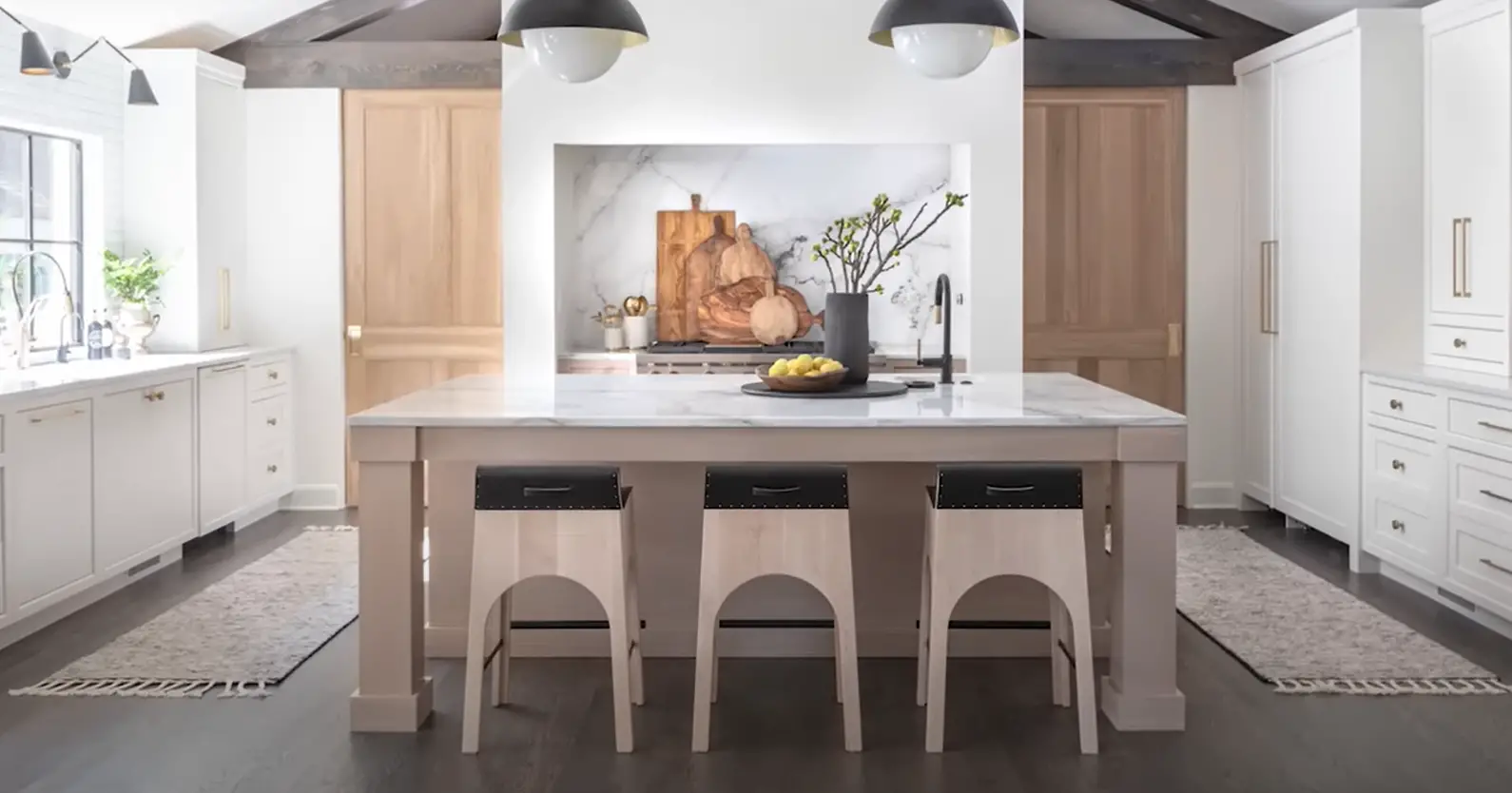
Satin finishes are often used to create a more intimate feeling in a space, while semi gloss finishes are more commonly used in formal spaces. The increased reflectivity, semi gloss finishes can also make a small kitchen appear brighter and bigger.
It’s also important to keep in mind that the sheen of your finish can affect the way colors appear. Colors tend to look brighter and bolder on semi gloss surfaces, while satin surfaces can make them look softer and more muted. [1], [2]
Durability
One of the most important factors to consider when choosing a cabinet finish is durability. A finish that looks beautiful for a few years but then starts to show wear and tear is not ideal. You want something that will stand up to the rigors of daily use and still look good for many years to come.
This doesn’t mean satin finishes are completely lacking in durability. They are still more durable than other finish options and can withstand daily use without issue. They just don’t have the same level of resistance as semi-glosses. [1], [2]
Moisture resistance
Another key difference between satin and semi gloss finishes is their moisture resistance. As we mentioned earlier, semi gloss finishes are much more resistant to moisture than satin finishes. This is because the resins in semi-gloss act as a barrier against moisture, preventing it from penetrating the paint. This makes them ideal for kitchen cabinets as kitchens are known for being high moisture areas.
While satin finishes are fairly resistant to moisture, they are not as resistant as semi gloss finishes. This means that they are more likely to be damaged by water and moisture over time. For this reason, they aren’t recommended for use in high humidity areas. If you choose a satin finish for your kitchen cabinets, it’s important to be extra diligent about wiping up spills and keeping the area clean and dry. [1], [2]
Scratch resistance
In general, semi-gloss finishes are more scratch resistant than satin finishes. This is because the resins in semi-glosses create a harder glossy surface that is more resistant to scratches.
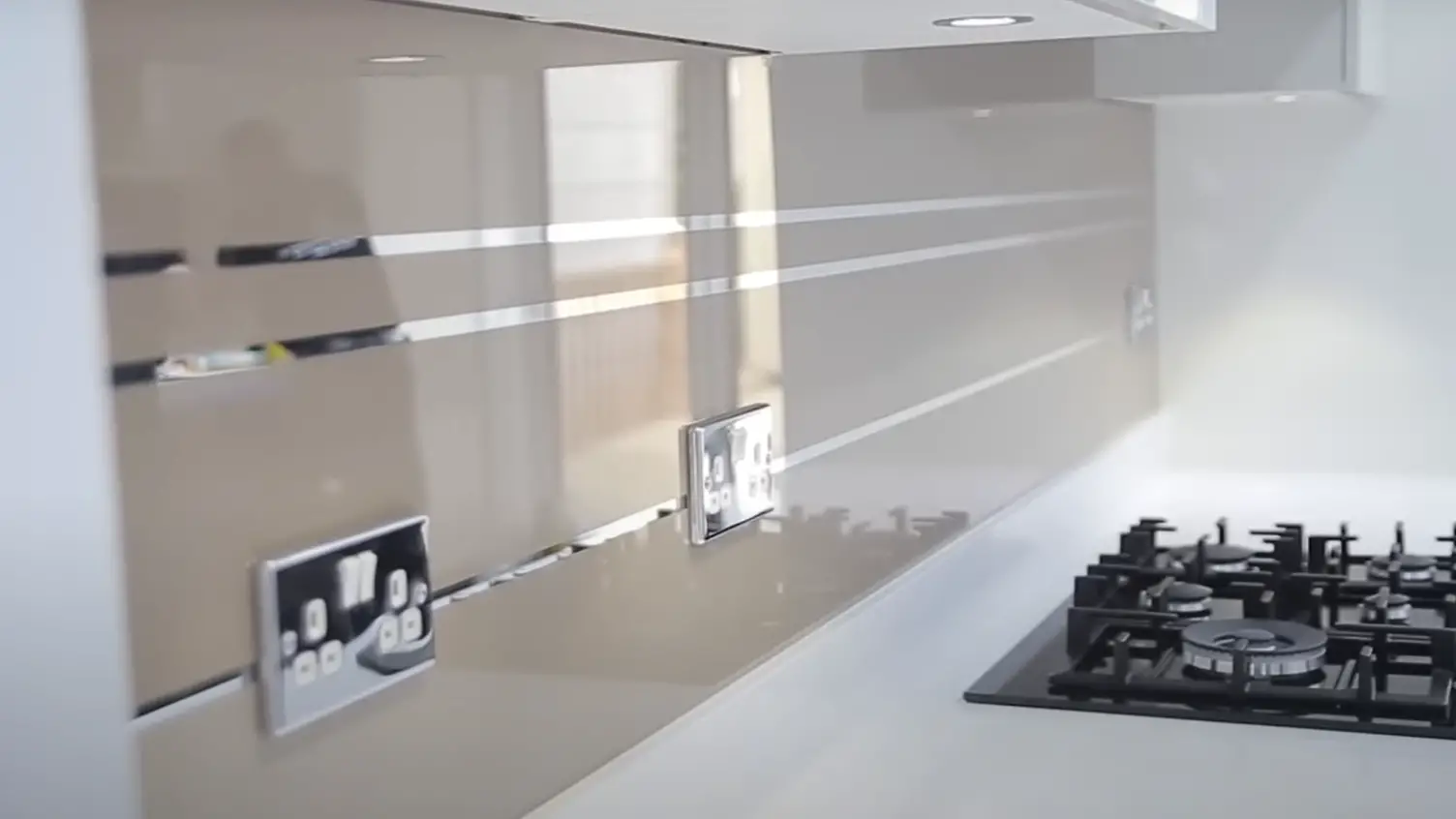
However, this doesn’t mean that satin finishes are completely lacking in scratch resistance. They are still more resistant to scratching than other finish options and can withstand daily use without issue. They just don’t have the same level of resistance as semi-glosses.
If you’re worried about scratches, it’s worth noting that both satin and semi-gloss finishes can be easily repaired with a little touch up paint. So if you do happen to scratch your cabinets, it’s not the end of the world. [1], [2]
Ease of maintenance
One thing to keep in mind is that both satin and semi-gloss finishes will show wear over time. This is especially true in high-traffic areas like kitchens. While they are both easy to clean, semi-gloss finishes are generally easier to maintain than satin finishes. This is because the glossy surface of semi-glosses makes it easier to wipe away dirt and grime. And, if you do happen to stain a semi-gloss finish, you can easily clean the stains with a soapy cloth as the finish won’t be scrubbed off.
Satin finishes, on the other hand, can be more difficult to keep clean. The lower level of shine means that dirt and grime can build up over time and be more difficult to wipe away. While cleaning may be trickier, touching up a satin finish is surprisingly easy. All you need to do is lightly sand the area and then reapply paint or varnish. [1], [2]
Price
Obviously, price is an important consideration when choosing a cabinet finish. And, while there is a wide range of prices for both satin and semi gloss finishes, there is generally a bit of a price difference between the two. This is because semi gloss finishes are more durable and moisture resistant than satin finishes, so they tend to cost more.
However, the major deciding factor is the type of wood you choose for your cabinets. Certain woods are more expensive than others, so that will have a bigger impact on the overall cost of your project. For example, cherry cabinets will be more expensive than maple cabinets regardless of the finish you choose.
So, if budget is a major consideration for you, satin may be the way to go. If you’re willing to spend a bit more for better durability and moisture resistance, semi-gloss is the better option. [1], [2]
Satin vs. Semi-Gloss Finish Kitchen Cabinets: Choosing the Ideal Finish
When selecting a finish for your kitchen cabinets, choosing between satin and semi-gloss can greatly influence the overall look and feel of your kitchen. To help you make an informed decision, we’ve created a detailed comparison table with multiple columns to evaluate the key differences between satin and semi-gloss finishes for kitchen cabinets across various aspects.
| Aspect | Satin Finish | Semi-Gloss Finish |
|---|---|---|
| Appearance | Offers a smooth, low-sheen finish that imparts a subtle and elegant look. | Provides a moderate sheen, creating a shiny and reflective surface. |
| Reflectivity | Reflects minimal light, which can help hide minor imperfections and create a softer ambiance. | Reflects more light, making surfaces appear brighter and more vibrant. |
| Coverage | Typically provides good coverage and can mask small surface blemishes or grain patterns in wood. | Offers excellent coverage and can enhance the natural beauty of wood while concealing minor imperfections. |
| Durability | May be less durable in high-traffic areas and more prone to showing fingerprints and smudges. | Offers greater durability and resistance to moisture, making it suitable for busy kitchens. |
| Maintenance | Requires less maintenance due to its forgiving nature but may show stains more prominently. | Is easier to clean and maintain, with a surface that repels stains and spills effectively. |
| Style | Creates a classic and timeless look suitable for various kitchen styles, from traditional to modern. | Offers a contemporary and sleek appearance that complements modern and minimalist kitchen designs. |
| Customization | Allows for customization with various colors while maintaining a subdued sheen. | Provides customization options in terms of color and wood grain while offering a noticeable sheen. |
| Cost | Costs can vary based on the quality of materials and the number of coats required. | Generally slightly more expensive due to the additional shine and durability. |
| Lighting | Works well in kitchens with ample natural light, as it won’t create excessive glare. | Can enhance lighting conditions in kitchens with less natural light by reflecting light effectively. |
| Resale Value | May appeal to a broad range of buyers and contribute to a higher resale value. | Can attract buyers who appreciate the clean and glossy appearance of semi-gloss finishes. |
Explanation of the Table:
- Aspect: Lists different aspects to consider when comparing satin and semi-gloss finishes for kitchen cabinets.
- Satin Finish: Provides information about satin finishes in each aspect.
- Semi-Gloss Finish: Provides information about semi-gloss finishes in each aspect.
By examining these aspects, you can make an informed decision about whether a satin or semi-gloss finish is better suited for your kitchen cabinet project, taking into account factors like appearance, maintenance, durability, and style preferences.
FAQ
Should kitchen cabinets be glossy?
It really depends on your preference! If you want a sleek and modern look, then glossy cabinets may be the way to go. However, if you’re going for a more rustic or homey feel, then matte or satin finishes would be better suited for your kitchen.
Glossy finishes are also much easier to clean than matte or satin finishes, so if you’re someone who likes to keep a tidy kitchen, that may be another factor to consider when choosing between cabinet finishes.
Is semi gloss or high gloss better for kitchen cabinets?
There is no definitive answer to this question as it depends on personal preference. Some people prefer the high gloss look as it gives the kitchen a more modern feel, while others prefer the satin finish for a softer look. Ultimately, it comes down to what you think looks best in your kitchen.
Semi gloss finish however is more resistant to moisture damage and staining, so if you are worried about your cabinets getting dirty or damaged easily, then a semi gloss finish would be a better option for you.
Should I use satin paint in the kitchen?
If you are looking for a paint that is easy to clean and maintain, then satin paint is a good choice for the kitchen. However, if you are looking for a paint that will show off the beautiful details of your cabinets, then semi-gloss paint would be a better option.
Satin paint has a low luster finish, which means it does not reflect light as much as semi-gloss or high gloss paints. This makes it ideal for hiding certain imperfections like fingerprints in the woodwork or cabinets, however it does make scratches and dents more noticeable.
What are the key differences between painted and stained kitchen cabinets?
The main differences between painted and stained kitchen cabinets are in their appearance and maintenance. Painted cabinets offer a smooth, opaque finish with a wide range of color options. They are also easier to clean and maintain. Stained cabinets, on the other hand, showcase the natural wood grain and come in various wood tones. They require periodic re-staining but can provide a warm and timeless look.
Which type of kitchen cabinets is more durable, painted or stained?
In terms of durability, painted kitchen cabinets tend to be more resistant to moisture, stains, and wear and tear. The paint creates a protective layer over the wood, making it less susceptible to damage. However, the longevity of both painted and stained cabinets depends on the quality of materials and craftsmanship, as well as proper care and maintenance.
Are there any considerations for choosing between painted and stained kitchen cabinets based on kitchen size or style?
The choice between painted and stained cabinets can be influenced by kitchen size and style. In smaller kitchens, lighter-colored painted cabinets can create a sense of openness, while darker stained cabinets may make a larger kitchen feel cozier. The overall style and color palette of your kitchen should guide your decision to ensure a cohesive look.
Which type of kitchen cabinets is easier to maintain in the long run?
Painted kitchen cabinets are generally easier to maintain in the long run. They are less likely to show stains and water damage and are easier to clean with a simple wipe-down. Stained cabinets, on the other hand, require periodic re-staining or resealing to maintain their appearance and protect the wood.
Can I change the finish of my kitchen cabinets from painted to stained or vice versa?
Changing the finish of your kitchen cabinets from painted to stained or vice versa can be a complex and costly process. It usually involves stripping the existing finish, sanding the wood, and applying the desired finish. It’s essential to consult with a professional cabinet refinisher or contractor to assess the feasibility and cost of such a transformation before proceeding.
What factors should I consider in terms of kitchen cabinet maintenance when making my decision?
When deciding between painted and stained kitchen cabinets, consider your willingness and ability to perform maintenance tasks. Painted cabinets may require less maintenance in terms of cleaning and touch-ups. Stained cabinets, however, will need periodic re-staining or sealing to protect the wood and maintain their appearance. Your lifestyle and preferences should guide your choice.
Useful Video: Kitchen makeover on a budget: cabinets from high gloss to matt finish
Conclusion
When it comes to choosing a finish for your kitchen cabinets, there is no right or wrong answer. It ultimately comes down to personal preference and what works best for your space. Aesthetically, both satin and semi gloss finishes can create a beautiful kitchen. If you’re looking for a more modern look, semi gloss may be the way to go. If you prefer an elegant appearance, satin may be better suited for you. When it comes to durability, both finishes are fairly equal. However, if your cabinets will see a lot of moisture or wear and tear, semi gloss may be the better option as it is slightly more resistant to these elements. That doesn’t mean satin is a bad choice, it just means you may have to put in a little extra effort to keep them looking their best. No matter which finish you choose, with proper care and maintenance your cabinets will last for years to come. All in all, both finishes can equally add style and function to your space so go ahead and choose the one that best fits your needs. Thanks for reading!
References
- https://www.hunker.com/13416981/satin-vs-semi-gloss-kitchen-cabinets
- https://jngpaintingdecorating.com/satin-vs-semi-gloss-kitchen-cabinets/

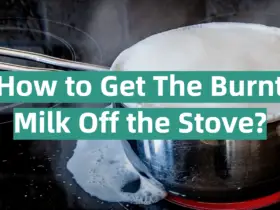
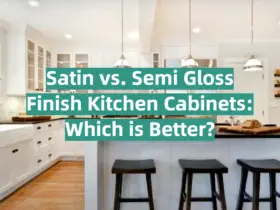
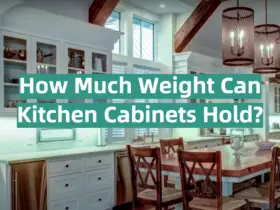

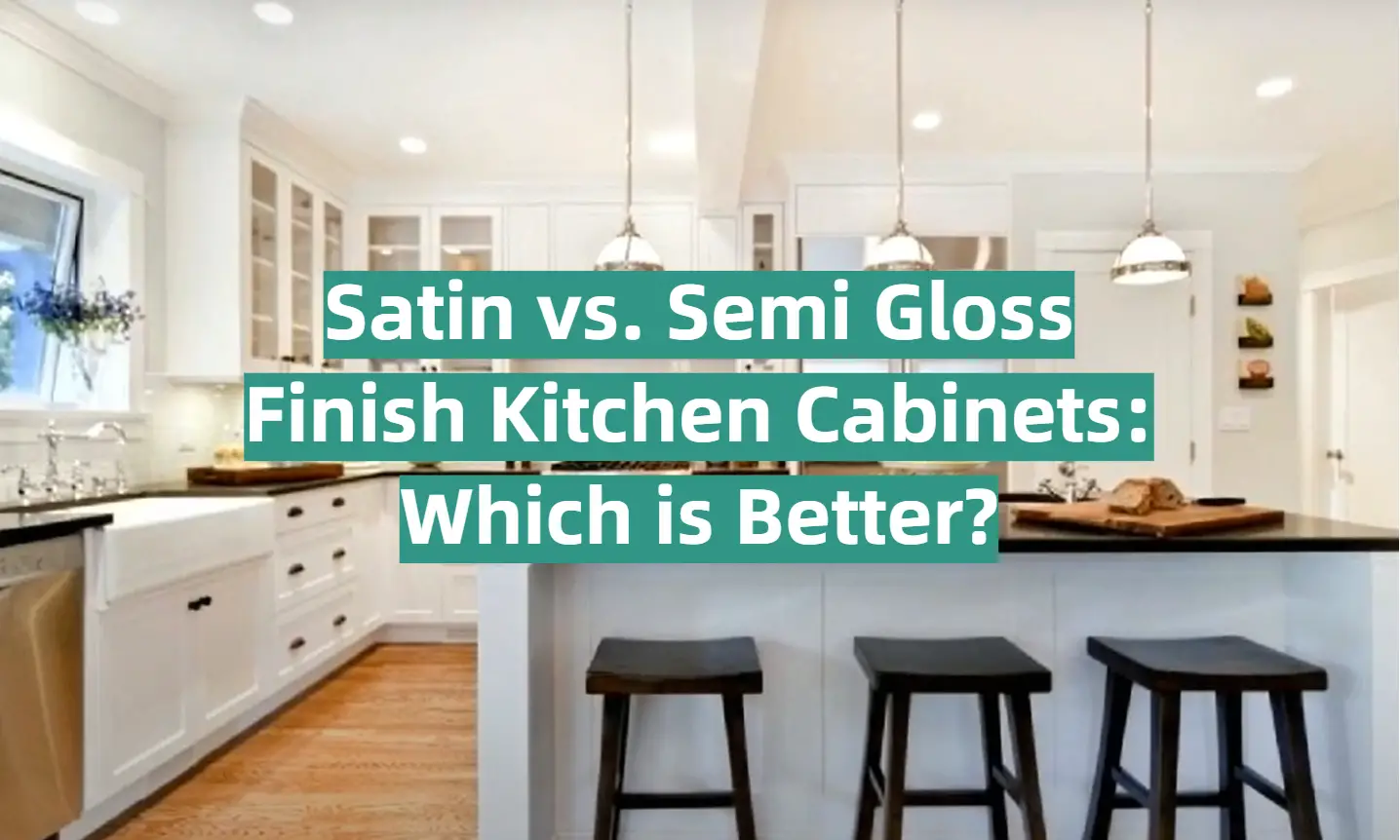
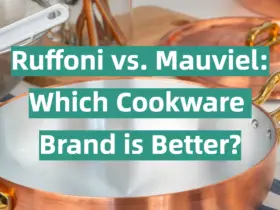
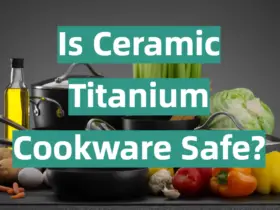
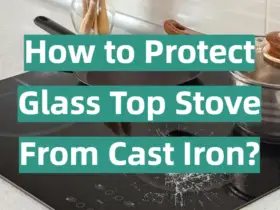

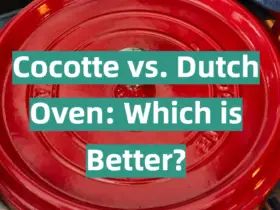
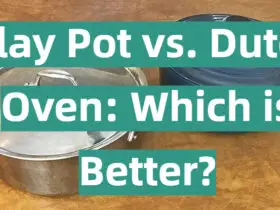
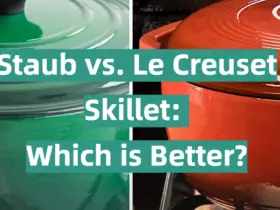
When we remodeled our kitchen last year, I struggled deciding between satin and semi gloss cabinets. I read that satin shows fewer imperfections, but semi gloss is more durable. We went with satin because I was worried about grease and fingerprints showing on semi gloss. I’m happy we chose satin – the soft sheen is beautiful, and fingerprints don’t show up too much. As long as you clean regularly, satin holds up well. I’d recommend it over semi gloss for most kitchens.
We just installed new semi gloss cabinets and are quite disappointed. They look beautiful at first, but any little smudge or water droplet shows. I’m constantly wiping them down to keep up appearances. Next time, I’ll go for a more forgiving satin finish. The soft glow of satin cabinets is gorgeous and far more practical for real-life kitchens that get used often.
When researching cabinet finishes, I was torn between satin and semi gloss. The high shine of semi gloss looked so sleek and elegant in photos. However, once installed in our kitchen, I realized the glare from semi gloss shows every single fingerprint and dust particle. I wish we had gone with a subtler satin finish instead. Satin provides a nice smooth finish without the upkeep of semi gloss.
We recently renovated and I chose satin cabinets. I didn’t want high-maintenance semi gloss that reflects everything. Satin has a refined, velvety look. The smooth finish hides fingerprints and cleans up easily. I don’t regret choosing satin at all. The soft glow is beautiful yet practical for my busy kitchen. I can cook confidently without worrying about grease splatters on my cabinets.
When picking new kitchen cabinets, it came down to satin vs semi gloss. The salesperson recommended satin for its durability and wipe-clean finish. I took their advice and am thrilled with my new satin cabinets. They have a nice smooth look without too much shine. I don’t see every little smudge like I did on the semi gloss cabinets in our old home. Satin was the right call for our kitchen.
We recently built our dream kitchen with semi gloss cabinets. They looked amazing in the store, but I regret the high-maintenance finish now. Fingerprints, dust, and any bit of oil show on the shiny surface. I’m constantly wiping them down. Next time, I’d choose satin cabinets for a smoother, more forgiving finish that doesn’t show every mark.
For our new kitchen, I debated between satin and semi gloss cabinets. The semi gloss looked flashy, but I was worried it would show imperfections. I took a chance and went with semi gloss. Big mistake – the shine magnifies every fingerprint and water droplet. I’m already sick of scrubbing the cabinets to look as good as new. Satin would’ve been the smarter choice for a busy kitchen.
When choosing cabinets, I went back and forth between satin and semi gloss finishes. The satin had a nice smooth look, while semi gloss looked bold and elegant. However, I realized those benefits came at a cost – semi gloss shows every single smudge and fingerprint. I’m so glad I went with durable, low-maintenance satin cabinets instead. Their subtle sheen hides normal wear and tear beautifully.
We recently updated our dated oak cabinets to white shaker style. I decided on a satin finish because I’d heard semi gloss shows every flaw. I love the results! The satin finish is smooth and sophisticated without excessive shine. My cabinets still look freshly painted after months of heavy use. I don’t regret choosing satin at all. Fingerprints wipe right off the durable surface.
I used to have old cabinets with a semi gloss finish. They were a nightmare to keep clean! Smudges and fingerprints showed constantly no matter how much I cleaned. When we remodeled, I insisted on satin cabinets. The change is amazing. Satin has a smooth, velvety look that camouflages small marks. It was the practical choice for my busy kitchen, and I’m never going back to high-maintenance semi gloss.
When choosing new kitchen cabinets, I debated between semi gloss and satin finishes. The bold shine of semi gloss looked beautiful at first glance. However, I realized satin would be far easier to live with. Semi gloss shows every single fingerprint and requires constant wiping down. I’m so glad I went with durable, low-maintenance satin instead. The soft glow is gorgeous without magnifying every little mark.
For our kitchen remodel, I struggled to decide between satin and semi gloss cabinets. Semi gloss looked so sleek in photos, but the high glare would drive me crazy. I took a chance on satin for its velvety finish. I absolutely love my new satin cabinets! They have a refined glow without showing every speck of dust. The smooth finish also resists fingerprints nicely. Satin was the practical choice for my busy kitchen.